-
 Bitcoin
Bitcoin $114400
1.32% -
 Ethereum
Ethereum $3499
2.20% -
 XRP
XRP $2.922
4.26% -
 Tether USDt
Tether USDt $0.0000
0.03% -
 BNB
BNB $752.6
1.53% -
 Solana
Solana $161.8
1.64% -
 USDC
USDC $0.9999
0.01% -
 TRON
TRON $0.3267
1.32% -
 Dogecoin
Dogecoin $0.1991
3.02% -
 Cardano
Cardano $0.7251
3.29% -
 Hyperliquid
Hyperliquid $38.32
3.36% -
 Stellar
Stellar $0.3972
7.58% -
 Sui
Sui $3.437
2.74% -
 Chainlink
Chainlink $16.29
3.65% -
 Bitcoin Cash
Bitcoin Cash $545.3
3.70% -
 Hedera
Hedera $0.2482
7.49% -
 Ethena USDe
Ethena USDe $1.001
0.03% -
 Avalanche
Avalanche $21.40
2.02% -
 Toncoin
Toncoin $3.579
1.56% -
 Litecoin
Litecoin $109.3
2.20% -
 UNUS SED LEO
UNUS SED LEO $8.951
-0.18% -
 Shiba Inu
Shiba Inu $0.00001220
2.75% -
 Polkadot
Polkadot $3.613
2.99% -
 Uniswap
Uniswap $9.173
3.78% -
 Monero
Monero $302.6
2.62% -
 Dai
Dai $0.0000
0.00% -
 Bitget Token
Bitget Token $4.320
1.52% -
 Pepe
Pepe $0.00001048
3.40% -
 Cronos
Cronos $0.1314
4.33% -
 Aave
Aave $259.4
3.54%
What does blockchain mean and how does it apply to the sharing economy?
Blockchain enhances the sharing economy by enabling secure, transparent, and intermediary-free transactions, reducing costs and increasing efficiency.
Apr 07, 2025 at 09:00 pm
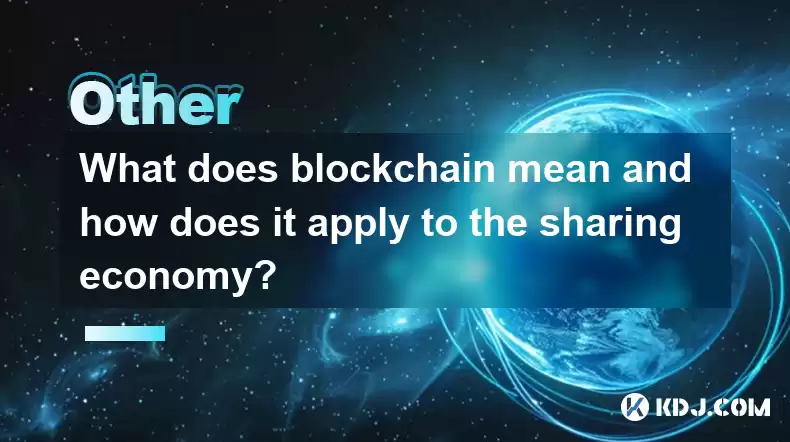
Blockchain technology is a decentralized, distributed ledger that records transactions across numerous computers. It ensures that each transaction is secure, transparent, and immutable. In the context of the cryptocurrency circle, blockchain is the underlying technology that powers cryptocurrencies like Bitcoin and Ethereum. It allows for peer-to-peer transactions without the need for intermediaries, which is a fundamental aspect of the sharing economy. The sharing economy, often referred to as the gig economy, revolves around the sharing of resources and services through online platforms. Blockchain can enhance this model by providing a trustless environment where participants can engage in transactions securely and efficiently.
What is Blockchain Technology?
Blockchain technology is essentially a chain of blocks where each block contains a list of transactions. These transactions are verified by network nodes and recorded in a public ledger. The decentralized nature of blockchain means that no single entity has control over the entire network, making it resistant to fraud and manipulation. In the cryptocurrency circle, blockchain is used to create and manage digital currencies. It ensures that once a transaction is recorded, it cannot be altered, providing a high level of security and trust. This technology is revolutionary because it allows for direct transactions between parties without the need for a central authority, which is a key feature of the sharing economy.
How Does Blockchain Work?
Blockchain operates on a consensus mechanism where multiple nodes in the network agree on the validity of transactions. This is typically achieved through mechanisms like Proof of Work (PoW) or Proof of Stake (PoS). In PoW, miners compete to solve complex mathematical problems to validate transactions and add them to the blockchain. In PoS, validators are chosen based on the number of coins they hold and are willing to "stake" as collateral. Once a transaction is verified, it is added to a block, and once a block is filled with transactions, it is added to the chain. This process ensures that the ledger remains accurate and tamper-proof. In the context of the sharing economy, this means that transactions between users can be securely recorded and verified without the need for a central authority.
Benefits of Blockchain in the Sharing Economy
Blockchain technology offers several benefits to the sharing economy. Firstly, it provides increased transparency and trust among participants. Since all transactions are recorded on a public ledger, users can verify the authenticity of transactions themselves. Secondly, blockchain reduces the need for intermediaries, which can lower transaction costs and increase efficiency. For example, in a ride-sharing platform, drivers and passengers can transact directly without the need for a middleman, reducing fees and increasing the share of earnings for drivers. Thirdly, blockchain enables smart contracts, which are self-executing contracts with the terms directly written into code. These can automate many processes in the sharing economy, such as payments and dispute resolution, making the system more efficient and user-friendly.
Examples of Blockchain in the Sharing Economy
Several projects within the cryptocurrency circle are leveraging blockchain to enhance the sharing economy. One example is Arcade City, a decentralized ride-sharing platform that uses blockchain to connect drivers and passengers directly. By eliminating the need for a central authority, Arcade City aims to reduce fees and increase the earnings of drivers. Another example is Slock.it, which uses blockchain and smart contracts to enable the sharing of physical assets like cars and homes. Users can rent out their assets and receive payments automatically through smart contracts, making the process seamless and efficient. These examples illustrate how blockchain can be applied to create more transparent, efficient, and user-friendly sharing economy platforms.
Challenges and Considerations
While blockchain offers significant benefits to the sharing economy, there are also challenges and considerations to keep in mind. One major challenge is scalability. As the number of transactions on a blockchain network increases, the network can become slower and more expensive to use. This is a critical issue for sharing economy platforms that require fast and low-cost transactions. Another consideration is regulatory compliance. Many sharing economy platforms operate in highly regulated industries, and the use of blockchain may raise legal and compliance issues. Additionally, user adoption is a challenge, as many people are still unfamiliar with blockchain technology and may be hesitant to use it. Addressing these challenges will be crucial for the successful integration of blockchain into the sharing economy.
Future Prospects of Blockchain in the Sharing Economy
The future of blockchain in the sharing economy looks promising. As the technology continues to evolve, it is likely that more platforms will adopt blockchain to enhance their operations. Decentralized finance (DeFi) platforms, which use blockchain to offer financial services without intermediaries, could also play a significant role in the sharing economy. For example, users could access loans or insurance directly through DeFi platforms, enabling them to participate more fully in the sharing economy. Additionally, advancements in layer 2 solutions and sharding could address the scalability issues currently facing blockchain networks, making them more suitable for large-scale sharing economy applications. As these developments unfold, blockchain has the potential to revolutionize the way resources and services are shared.
Common Questions Related to Blockchain and the Sharing Economy
Q: What is the main advantage of using blockchain in the sharing economy?
A: The main advantage is the ability to conduct secure, transparent, and intermediary-free transactions. This can reduce costs, increase efficiency, and build trust among participants.
Q: How do smart contracts work in the sharing economy?
A: Smart contracts are self-executing contracts written in code that automatically enforce the terms of an agreement. In the sharing economy, they can automate processes like payments and dispute resolution, making transactions more efficient and user-friendly.
Q: What are some examples of blockchain-based sharing economy platforms?
A: Examples include Arcade City, a decentralized ride-sharing platform, and Slock.it, which enables the sharing of physical assets through blockchain and smart contracts.
Q: What are the main challenges facing the integration of blockchain into the sharing economy?
A: The main challenges include scalability, regulatory compliance, and user adoption. Addressing these issues will be crucial for the successful implementation of blockchain in the sharing economy.
Q: How might future developments in blockchain technology impact the sharing economy?
A: Future developments like layer 2 solutions, sharding, and the growth of decentralized finance (DeFi) could enhance the scalability and functionality of blockchain, making it more suitable for large-scale sharing economy applications.
Disclaimer:info@kdj.com
The information provided is not trading advice. kdj.com does not assume any responsibility for any investments made based on the information provided in this article. Cryptocurrencies are highly volatile and it is highly recommended that you invest with caution after thorough research!
If you believe that the content used on this website infringes your copyright, please contact us immediately (info@kdj.com) and we will delete it promptly.
- Cryptocurrency, Altcoins, and Profit Potential: Navigating the Wild West
- 2025-08-04 14:50:11
- Blue Gold & Crypto: Investing Disruption in Precious Metals
- 2025-08-04 14:30:11
- Japan, Metaplanet, and Bitcoin Acquisition: A New Era of Corporate Treasury?
- 2025-08-04 14:30:11
- Coinbase's Buy Rating & Bitcoin's Bold Future: A Canaccord Genuity Perspective
- 2025-08-04 14:50:11
- Coinbase's Buy Rating Maintained by Rosenblatt Securities: A Deep Dive
- 2025-08-04 14:55:11
- Cryptos, Strategic Choices, High Returns: Navigating the Meme Coin Mania
- 2025-08-04 14:55:11
Related knowledge
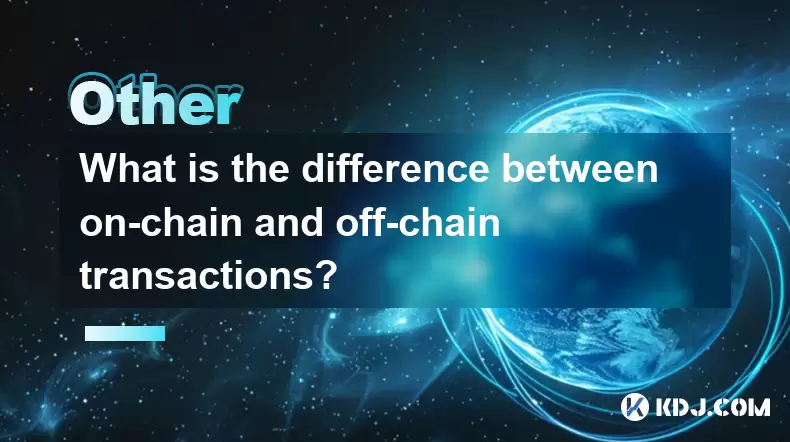
What is the difference between on-chain and off-chain transactions?
Aug 02,2025 at 04:22pm
Understanding On-Chain TransactionsOn-chain transactions refer to digital asset transfers that are recorded directly on a blockchain ledger. These tra...
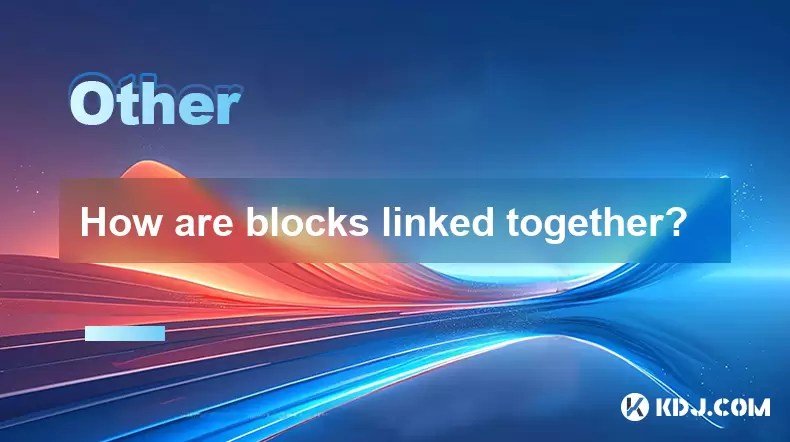
How are blocks linked together?
Aug 04,2025 at 06:56am
Understanding the Structure of a BlockchainA blockchain is a decentralized digital ledger composed of a sequence of blocks, each containing a list of ...
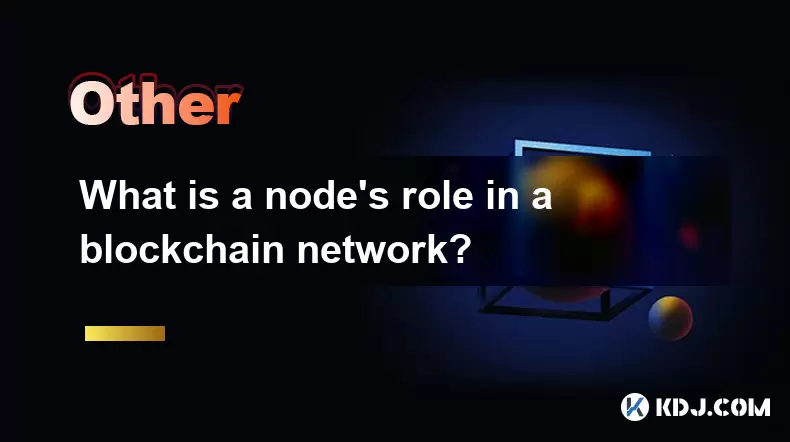
What is a node's role in a blockchain network?
Aug 03,2025 at 03:16pm
Understanding the Function of a Node in a Blockchain NetworkA node is a fundamental component of any blockchain network, acting as a participant that ...
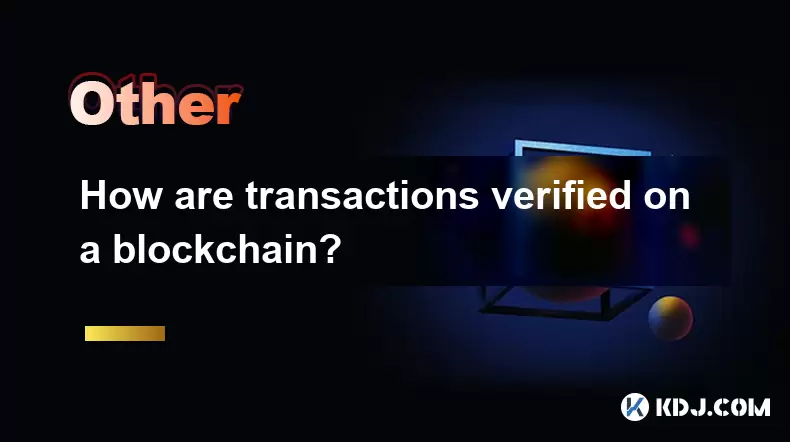
How are transactions verified on a blockchain?
Aug 04,2025 at 12:35am
Understanding the Role of Nodes in Transaction VerificationIn a blockchain network, nodes are fundamental components responsible for maintaining the i...

What is the double-spending problem and how does blockchain prevent it?
Aug 02,2025 at 01:07pm
Understanding the Double-Spending ProblemThe double-spending problem is a fundamental challenge in digital currency systems where the same digital tok...
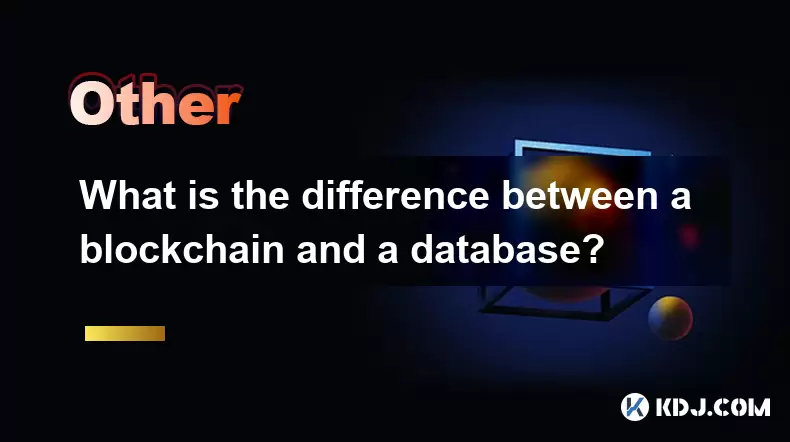
What is the difference between a blockchain and a database?
Aug 01,2025 at 09:36pm
Understanding the Core Structure of a BlockchainA blockchain is a decentralized digital ledger that records data in a series of immutable blocks linke...

What is the difference between on-chain and off-chain transactions?
Aug 02,2025 at 04:22pm
Understanding On-Chain TransactionsOn-chain transactions refer to digital asset transfers that are recorded directly on a blockchain ledger. These tra...

How are blocks linked together?
Aug 04,2025 at 06:56am
Understanding the Structure of a BlockchainA blockchain is a decentralized digital ledger composed of a sequence of blocks, each containing a list of ...

What is a node's role in a blockchain network?
Aug 03,2025 at 03:16pm
Understanding the Function of a Node in a Blockchain NetworkA node is a fundamental component of any blockchain network, acting as a participant that ...

How are transactions verified on a blockchain?
Aug 04,2025 at 12:35am
Understanding the Role of Nodes in Transaction VerificationIn a blockchain network, nodes are fundamental components responsible for maintaining the i...

What is the double-spending problem and how does blockchain prevent it?
Aug 02,2025 at 01:07pm
Understanding the Double-Spending ProblemThe double-spending problem is a fundamental challenge in digital currency systems where the same digital tok...

What is the difference between a blockchain and a database?
Aug 01,2025 at 09:36pm
Understanding the Core Structure of a BlockchainA blockchain is a decentralized digital ledger that records data in a series of immutable blocks linke...
See all articles

























































































